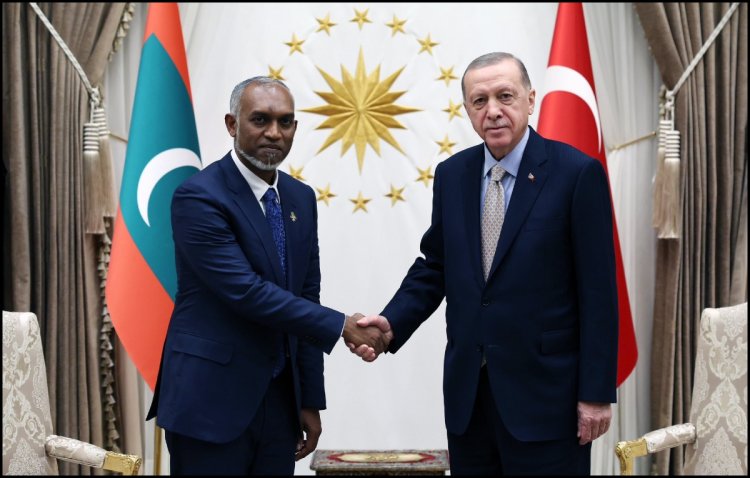India - Maldives: Turkey is Muizzu’s First Destination

Turkeye is Maldives President’s Muizzu’s first destination. This, according to C Raja Mohan (senior fellow at the Asia Society Policy Institute, Delhi and a contributing editor on international affairs for The Indian Express) “underlines the recent pattern of significant swings in foreign policy with every change of government. It is tempting to view the shift in the strategic orientation of the Maldives under Muizzu as a natural inclination of small countries to diversify their security partnerships. But more is at play in the Maldives.
“Smaller states of the Subcontinent are becoming attractive geopolitical targets not only for the US, China and Russia but also for middle powers like Turkey. Muizzu’s visit is also a reminder of Turkey’s growing strategic footprint in the Subcontinent and rising geopolitical friction between Delhi and Ankara.”
Implications for India
Mohan seeks to explain the implications for India. The key is understanding three imperatives that are producing structural changes in the geopolitics of the Subcontinent.
First “is the recognition of the growing political agency of the elites, even in the smallest of our neighbours. Contrary to the popular narrative, the small states in the Subcontinent are not mere ‘pawns’ in the great power rivalries, including those between Delhi and Beijing.
“As the strategic value of the smaller countries for the major powers becomes explicit, the local elites have learnt to play the external powers against each other.”
A second change in the regional environment “is the fact that rising middle powers can now match the major powers in their ability to deliver favours to the local elites. Over the last decade, Iran, Qatar, Turkey, Saudi Arabia, and the United Arab Emirates have all demonstrated the will and capability to act as external patrons — political, economic and military — to competing political factions in various states located in Africa, the Middle East and the Indian Ocean.”
Third, “Turkey remains an underestimated power in the Indian strategic discourse despite its growing assertiveness in our extended neighbourhood, including Africa, the Mediterranean, the Caucasus, Central Asia and the Subcontinent. Erdogan has leveraged Turkey’s multiple identities to pursue his expansive geopolitical ambitions…..
“To the extent that India viewed Turkey seriously, it was through the lens of Pakistan…..” Recep Tayyip Erdogan “has intensified Turkey’s diplomatic and political support for Islamabad on Kashmir. Even as he turned the traditional partnership with Pakistan into a trilateral alliance with Azerbaijan, Erdogan has sought to raise Turkey’s profile in Afghanistan and Bangladesh.”
Turkey, Maldives cooperation
Thus, getting Muizzu to travel to Ankara on his first foreign visit, writes Mohan “underlines the success of Turkey’s foray into the island states of the Indian Ocean. This is not a diplomatic bolt out of the blue. Last year, the Turkish foreign minister made the first-ever visit to Sri Lanka and the Maldives and laid the basis for deeper engagement.
“Turkey has now stepped in to seize the strategic possibilities opened by Muizzu’s plan to turn Maldives away from India. Erdogan rolled out the red carpet in Ankara for Muizzu, accompanied by his foreign, trade, defence ministers and other senior officials. Turkey’s ambition to draw the Maldives into its Islamic orbit figured prominently in the visit. It remains to be seen if Ankara’s regional Islamist partners, like Doha and Islamabad, will follow Turkey into the Maldives.”
Besides a bilateral trade agreement that was signed in their presence, Muizzu and Erdogan have reportedly discussed a range of other areas of cooperation, including defence. Turkey, with its flourishing arms industry, “is well-placed to deliver significant military assistance to the Maldives as Muizzu pushes to end defence cooperation with India.”
India’s options
While near-term setbacks for India in the Maldives seem inevitable, Mohan suggests “Delhi must necessarily remain patient in engaging with the critical neighbour. India’s long-term bet in the Maldives must focus on four elements.
“One is the importance of India’s geographic proximity to the Maldives. This is unlikely to change despite the frequent shifts in the Maldives’ foreign policy.
“Second, India needs more and not less engagement with the domestic politics of the Maldives. The recent election in Maldives has shown that small changes in the domestic balance of power can produce major changes in the external orientation of Maldives. There is nothing to suggest that the current internal dynamic in the Maldives is immune to change.
“Third, India must work with its like-minded partners in the Gulf to prevent any potential destabilisation of the Maldives by Turkey. Saudi Arabia and the UAE have often been at the receiving end of Erdogan’s regional assertiveness and have a stake in preventing the Maldives from being sucked into a Turkish sphere of influence.
“Finally, as Turkey advances into the Maldives, Delhi can’t adopt a defensive strategy limited to South Asia. Turkey’s rise is real, and its impact on the Subcontinent will continue to grow. Delhi needs a more active posture in Ankara’s neighbourhood to improve India’s position in the intensifying geopolitical joust with Turkey.”















